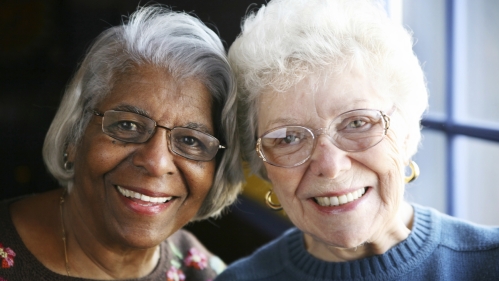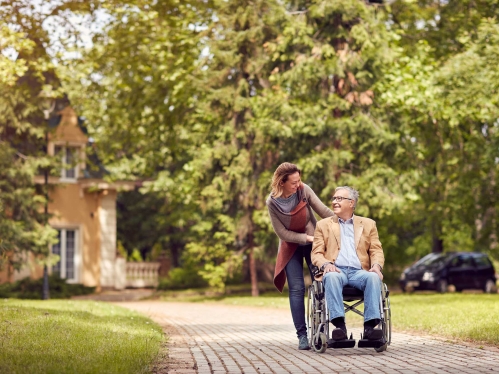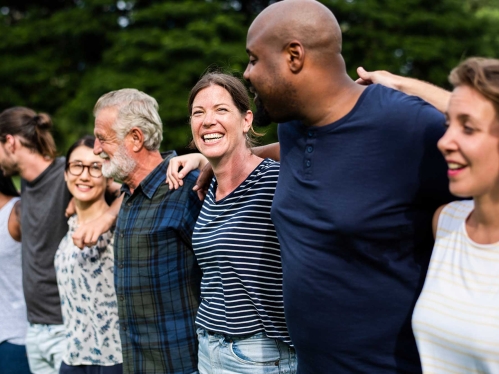
Research & Opportunities
Partner in our Work
The goals of the Rutgers School of Social Work and the MSW Certificate in Aging and Health run parallel: to produce social workers that demonstrate ethical, inclusive and professional behavior while delivering services to individuals, families, groups, organizations and communities within aging populations.
Read below our program goals for the future of the MSW Certificate in Aging and Health.

Future Program Goals
- Scholarships to maintain the School's Fellowship in Aging program
- Scholarships to support MSW Certificate in Aging students' cross-national education and service abroad
- Programmatic support (e.g., funds to support group supervision for students in non-traditional aging-focused placements, such as banks)
- Scholarships for aging-focused work-study internships
For organizations and individuals who are interested in giving to the School of Social Work's Programs in Aging, please email Erin Capone, Senior Director of Development, New Brunswick.

Faculty Research in Aging
Rutgers School of Social Work faculty is advancing knowledge in the field of gerontological social work-guiding practices for the profession and helping shape policy for the future. Below is a list of several faculty members at the School of Social Work who have active research agendas in aging.
Ayse Akincigil (PhD, Rutgers University) is interested in studying the medical care and services provided to older adults and those with chronic conditions such as HIV or depression. Recently, she has been focusing on quality of mental health care and treatment adherence.
DuWayne Battle (PhD, Rutgers University) conducts research on the importance of religion and spirituality in helping older adults cope with depression related to serious illness and bereavement. He is particularly interested in personal and public aspects of religion and spirituality, such as, congregational activities that are helpful to individuals, families, and communities.
Patricia Findley (DrPH, University of Illinois, Chicago) conducts research in the area of chronic illnesses and disabilities with a focus on community-based living. Her current projects include diabetes and stroke in older veterans and the implications of psychosocial interventions on the prevention of secondary complications.
Emily A. Greenfield (PhD, University of Wisconsin, Madison) conducts research on how aspects of social relationships influence mental and physical health in middle and later life. She is particularly interested in how adults' civic engagement activities-such as volunteering or spending time with grandchildren-can promote optimal individual, family, and societal well-being. She also conducts research on community practice initiatives in aging.
Lia Nower (PhD, Washington University; JD, St. Louis University Law School) is researching older adult casino gamblers, specifically, reasons for self-excluding from venues, risk and protective factors, suicidality, and the legal impact of gambling expenditures on Medicaid eligibility. She is also developing an intervention for use in senior centers and residential facilities to dispel faulty gambling-related cognitions and promote responsible gambling behavior.
Karen Zurlo (PhD, University of Pennsylvania) conducts quantitative and qualitative research on older adults and retirement-related topics that include economic security, mental health and depression, and socio-demographic factors affecting access to health care. Currently, she is researching the influence of chronic stressors and coping resources on mental health and well-being in late life.

Institute for Health
Rutgers University's Institute for Health, Health Care Policy, and Aging Research facilitates the efforts of University faculty, other investigators, staff, postdoctoral trainees and students conducting research to promote optimal health for diverse populations. To visit the Institute's website, please click here. (BROKEN LINK. Cannot find replacement on current site. )





University-Community Projects in Aging
Rutgers School of Social Work partners with community organizations and government agencies to improve the well-being of older adults and their caregivers. Below are examples of ongoing and completed work that has developed out of university-community partnerships.

Ongoing Initiatives
Exploring Naturally Occurring Retirement Community Supportive Services Programs (NORC-SSPS) in New Jersey
NORC-SSPs are community-based initiatives that aim to create more comprehensive supportive service systems that help older adults remain within their own homes, even when faced with aging-related challenges. NORC-SSPs address a range of services, including healthcare, social services, lifelong learning, health promotion, and opportunities for civic engagement. In New Jersey, more than 10 Jewish communal service agencies have partnered with other agencies to implement NORC-SSPs. The Rutgers School of Social Work is working collaboratively with the state's Jewish communal agencies to examine how this program model has been implemented in New Jersey. The primary purpose of the project is to understand how NORC-SSPs in New Jersey have addressed common, as well as distinct, needs across diverse communities. For more information, please email Dr. Emily Greenfield (Principal Investigator) at . A copy of a report from this project is available here. (Consider rewording 'Here' as name of report. Not clear what that is...title?)

Adult Protective Services Training Grant
The Adult Protective Services Training Institute, coordinated by the Office of Continuing Education (CE), has been the sole source for statewide training to Adult Protective Service (APS) workers since its inception in 1991. This training program consists of a sixteen-day education series in which the new APS worker becomes familiar with the many demanding facets of protecting the fragile population of older adults in New Jersey.

Evaluating Substance Abuse Treatment among Older Adults
The Institute for Families (IFF) is assessing the progress of senior citizens who participate in the Wellness Initiative for Senior Education (WISE) substance abuse prevention program. Through both quantitative and focus group evaluation, IFF is documenting changes in knowledge, attitudes, and self efficacy of the WISE program participants. Funded through the New Jersey Prevention Network, WISE evaluation activities have found significant differences between those who participated in WISE and a control group that did not participate in the program. Specifically, the evaluation determined that participants had an enhanced knowledge of medication and the effects of alcohol, felt empowered by the program, increased their understanding of health and wellness, and changed their lives in a positive way. Overall, the participants enjoyed the program and the information it provided.





